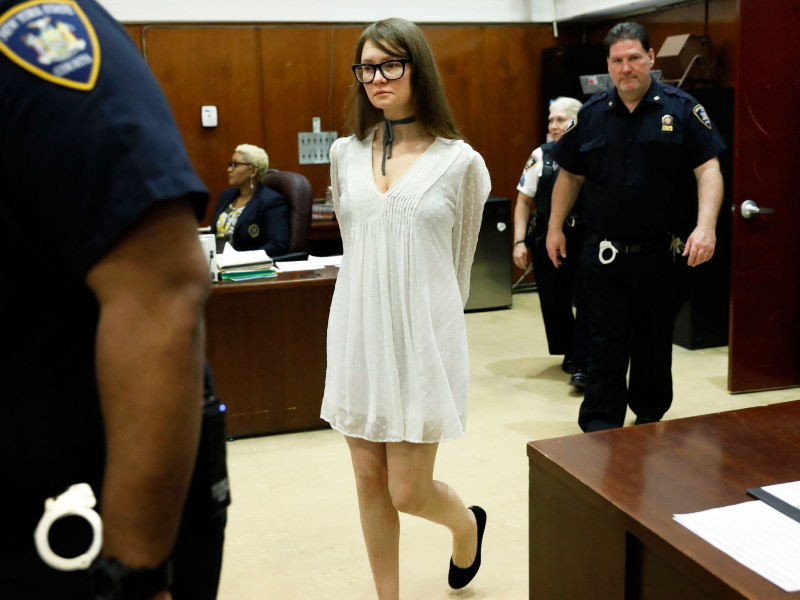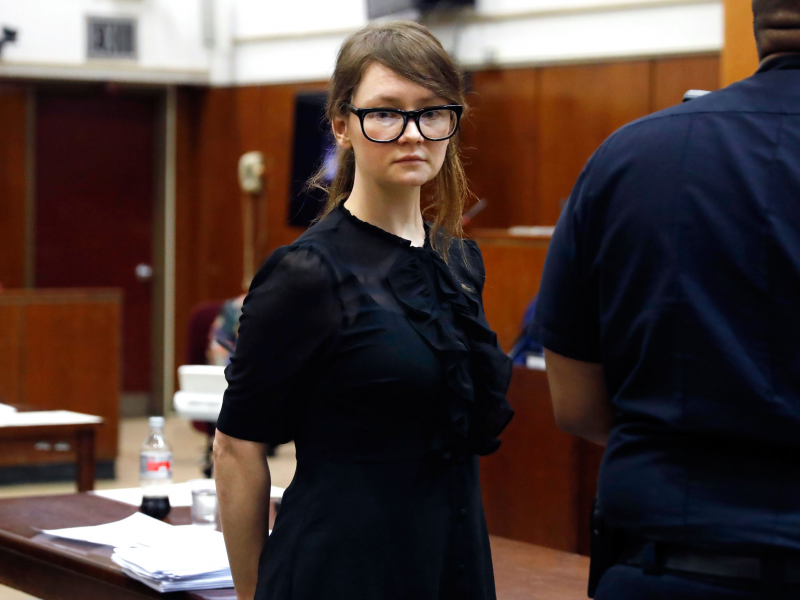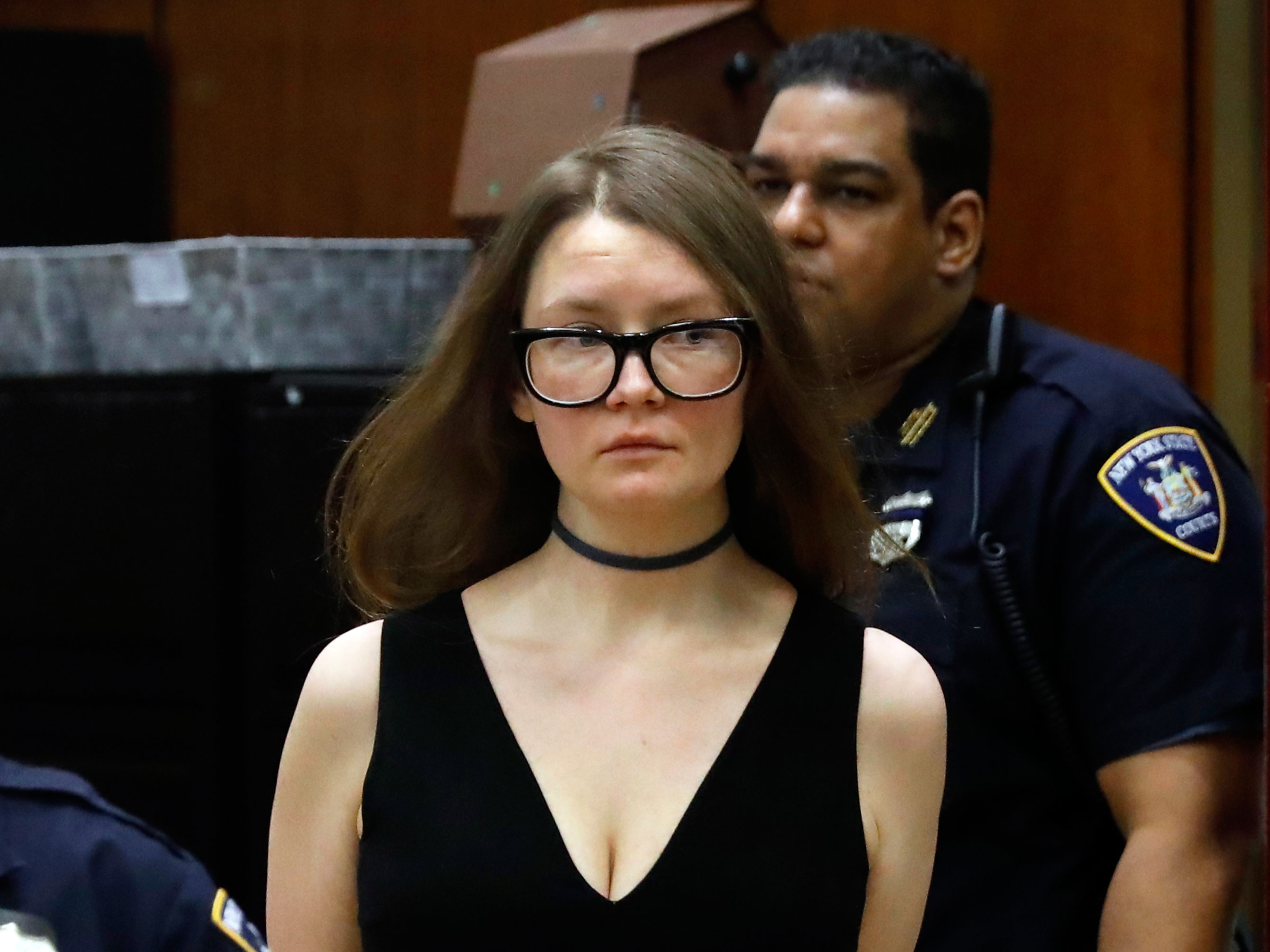- Anna Delvey scammed New York’s socialite scene by pretending to be a German heiress and leveraged that identity to try to get $22 million from banks.
- Prosecutors charged the fake heiress, whose real name is Anna Sorokin, with 10 counts of theft, larceny, and attempted theft and larceny for her scheme.
- In a monthlong courtroom battle, her attorney, Todd Spodek, said she wanted to keep up the ruse only until she could get the investments for a legitimate business plan that would help her pay everyone back.
- The jury ultimately found her guilty of four counts of theft of services, three counts of grand larceny, and one count of attempted grand larceny.
- She was found not guilty of attempted grand larceny in the first degree, and she was also acquitted of a charge that she stole $60,000 from a friend for a trip to Morocco.
- Delvey’s taste for fashion and lavish trips to Morocco and Venice drew widespread press attention. HBO and Netflix have dueling projects about her in the works.
- Here is the inside story of her trial.
If not for the handcuffs shackling her wrists, Anna Delvey looked ready for an art-gallery opening. On the first day of her three-week trial on charges that she scammed her way through the hotels and socialites of New York City, she entered the courtroom wearing a black sleeveless Miu Miu dress, black-framed Celine glasses, and a tight black choker encircling her neck. Even if she wasn’t the German heiress backed by a $60 million trust fund she had claimed to be, she was no criminal, her clothes insisted. She belonged in a SoHo hotel, cocktail in hand – not in this drab courtroom.
In October 2017, prosecutors in Manhattan charged Delvey with stealing about $300,000 and attempting to steal at least another $22 million. They charged her with 10 counts of larceny, theft, and attempted theft and larceny – all alleged scams against various financial institutions, hotels, and a former Vanity Fair photography editor she befriended before conning out of $62,000.
During opening arguments on March 27, Assistant District Attorney Kaegan Mays-Williams laid out to the jury what prosecutors saw as the depths of the defendant’s deception: That her real name was Anna Sorokin, that she used a voice-disguising app to engineer her schemes, and that she lied about everything from her birthplace to her background to live a life “fit for a Kardashian.”
Todd Spodek, Delvey’s lawyer, mounted an unconventional defense. His client was a “bright-eyed and bushy-tailed” dreamer, a then-25-year-old German national who arrived in New York in 2016 with the same mission as everyone else: to turn her dreams into reality. So what if she had to fake it till she made it? “There’s a little bit of Anna in all of us,” Spodek said. “Everyone lies a little bit.”
Delvey's ultimate goal, Spodek said, was to raise funds for the Anna Delvey Foundation, a proposed mixed-use art-and-restaurant space. The chance to meet with private bankers and get a $22 million loan "did not exist for Anna Sorokin - the opportunity existed for Anna Delvey," Spodek argued.

From the start of the trial to its end on Tuesday, the case was all about appearances. And even though they said Delvey used false financial documents to misrepresent her net worth, prosecutors didn't charge her with bank fraud. Bank fraud is a white-collar crime. Theft and larceny are something baser.
The charges didn't appear to match the image of the savvy, sophisticated woman Delvey projected in the courtroom. Delvey sat in a plush red chair before the judge's bench, taking notes and largely staying silent during the proceedings. Her clothes struck a sharp contrast with the shabby courtroom, with its pocked wooden benches and gum stuck under every seat.
The paper trail was clear. But the charges, Spodek said, were a misunderstanding. Delvey wasn't a thief; she just owed some people some money, and she meant to pay back every penny. It was a civil dispute, sure, but it wasn't a crime. It all depended on how you looked at it.
As I watched the trial unfold, I struggled to figure out who Anna Delvey was. Her scam had unraveled, but she seemed to insist on maintaining vestiges of the illusion she had manufactured. The trial put forth two competing theories. Was she a villainous thief who tried to trick financial institutions into giving her millions of dollars, planning to slink away once she got it? Or did she pretend to be an heiress only so she could be in a position to borrow money for an ambitious business plan that, had it succeeded, would have given her enough to pay back her lenders? How much was she Anna Sorokin, and how much was she Anna Delvey?
Delvey's scam grew beyond her control
In reality, Delvey was born in Russia in 1991, moved to Germany in 2007, went to Central Saint Martins in London, and interned in Berlin and Paris. Her father worked as a truck driver, later rising to executive positions in a transportation and heating-and-cooling businesses, as the New York magazine journalist Jessica Pressler wrote in her profile of Delvey. Her family seemed at least middle-class, though not wealthy enough to regularly indulge in Alaïa.
When Delvey arrived in New York in early 2016, she claimed - depending on who she spoke to - that her family's wealth came from the tech industry, oil, solar panels, or a vast collection of European antiques. Delvey lived in chic SoHo hotels, wore Balenciaga and Supreme, dined at expensive restaurants, and jetted off to Ibiza and Venice at a moment's notice, Pressler wrote.
Her grift was simple: Identify her mark, take them out to an expensive restaurant or trip, stick them with the bill, promise to pay them back later, and conveniently "forget." It mostly worked. Delvey deftly navigated New York's socialite circles, landing meetings with people like Gabriel Calatrava - the son of the famed World Trade Center architect Santiago Calatrava - who helped her plan the foundation. She continued to lie about her identity even as she met with bankers in an attempt to secure a $22 million loan to fund her foundation.

The con fell apart. As prosecutors showed, Delvey falsified bank statements to show that she was worth tens of millions of dollars when she was not, and financial institutions suspected she wasn't forthcoming about her net income. Delvey didn't give phone numbers for her supposed family accountants, and bank statements she provided didn't look quite right. The red flags piled up.
Delvey was ultimately undone by Rachel Williams, a photography editor at Vanity Fair whom she befriended in February 2016 at a nightclub called Happy Ending. Over the next year and a half, they dined at expensive restaurants and spent time at an infrared sauna, a cubicle-like room Williams described as "kind of like a microwave," where the two hung out and listened to music. Delvey almost always footed the bill.

In May 2017, Delvey invited Williams to a trip to Morocco, which she said she would pay for. Accompanied by Jesse Hawk, a photographer and videographer, and Kacy Duke, Delvey's personal trainer, who helped Dakota Johnson get in shape for "50 Shades of Grey," they stayed at a lavish Moroccan villa in Marrakesh with a personal butler. They spent thousands dining out, visiting a resort owned by Richard Branson, and taking a private tour of Yves Saint-Laurent's famed Majorelle Garden.
Soon, Delvey's credit card stopped working. Williams gave the hotel her personal card and one she used for work expenses, and Delvey promised to pay her back. The total bill: $62,000. Williams soon fell behind on her rent and was forced to borrow tens of thousands of dollars as she tried to get Delvey to pay her back, to no avail.
"I would never had agreed to this if I knew it would take this long," Williams texted Delvey in messages introduced as evidence in the trial. "Wires do not take weeks. Wires do not take days, even ... You're starting to sound like a fraud."

Williams eventually went to the police, who by then had caught on to Delvey's alleged attempted thefts. Williams helped the New York Police Department extradite Delvey from California, where she had fled, back to the city to face charges.
"In hindsight, it's easier to figure out the times where there were red flags," Williams said in her testimony. "But at the time, I did not find it strange."
Williams is set to profit handsomely from the whole ordeal. She wrote a feature about her experience for Vanity Fair, which she's now adapting into a full-length book at Simon & Schuster for $300,000. HBO paid her $35,000 to option it into a project with Lena Dunham, and she stands to make another $300,000 for it.
On the stand, after intense questioning from Spodek, who later described Williams as an opportunist who "deserves an Oscar for her performance," she broke down in tears and said her actions weren't just about money.
"I didn't want the trial or the testimony to be misconstrued as something to benefit myself," she said, her voice shaking. "This is the most traumatic thing I've ever been through. I wish I never met Anna. If I could go back in time and change things - I wish I could."
She's a creature of the press. A courtroom has different rules.
Since October 2017, Delvey has been incarcerated on Rikers Island. She was shuttled between the jail and the New York Supreme Court courthouse in Manhattan during the trial. Weeks of waking up at 4 a.m., sitting through witness testimony, and coming back to her jail cell at 11 p.m. had taken a toll. Despite her professionally styled outfits, she looked tired.
For most of Delvey's trial, Catherine McCaw, the lead assistant district attorney trying the case, showcased for the jury a dull parade of bankers. In their witness testimonies, they read through a series of documents and emails and text-message exchanges with Delvey.
It could get monotonous. Pretty much everyone - from the jurors to the judge - was bored. One juror was kicked off the panel for repeatedly falling asleep.
But with her reams of evidence, McCaw methodically deconstructed the fabricated persona of the savvy socialite-businesswoman Anna Delvey, replacing it with a tawdry portrait of Anna Sorokin, whose lies amounted to a galling series of crimes. She did not intend to pay her victims back, McCaw said.

Delvey herself provided most of the drama. Spodek recruited Anastasia Nicole Walker, a well-known stylist who's worked with Kanye West, Courtney Love, and Madonna, to dress her for the trial. He compared the logistics involved in outfitting Delvey in Yves Saint Laurent to "entering the Twilight Zone." On a few days, she refused to enter the courtroom in the clothing the court provided her, earning her a reprimand from the judge, Diane Kiesel, for delaying the proceedings. "This is unacceptable and inappropriate … This is not a fashion show!" Kiesel said. Yet on Instagram, Delvey's outfits were lovingly chronicled in an Instagram account called Anna Delvey Court Looks.
While Spodek was trying to spin a narrative with reporters, prosecutors couldn't care less. Despite the sexiness of the case, they ignored journalists and just focused on the jury. They didn't tell the public about when witnesses would testify or guide them through the knotty details of Delvey's schemes. The prosecutors even asked Kiesel to stop Spodek from asking one witness to answer questions about his "flirty text messages" to Delvey. One day in the middle of the trial, when most reporters skipped it to avoid sitting through McCaw's granular questioning, Delvey looked around the nearly empty courtroom and asked, "Where is everyone?"

Delvey's outfit antics suggested she still believed in the myth she had constructed for herself, that of a natural-born social climber and aspiring entrepreneur crafting a legitimate business plan who needed to lie only until she'd secured the investments that would fund her foundation. But it also called that myth into question. The outfit provided by the court, a plain white button-down shirt and black trousers, was not exactly Tom Ford, but neither was it a travesty. Delvey knew journalists were paying attention to her clothing, Spodek said, but she also must have known the risks of irritating the judge presiding over her trial.
Maybe her insistence on control was the problem. She wove her scam around a narrative that strung wealthy and powerful people along with her. But in reality, she was not wealthy. And the machinations of the law showed that beneath the glamour, she was not powerful. Despite her best attempts, she couldn't transcend her reality. All she had left to project her image was the clothing she wore.
The jury found Delvey guilty on 8 of 10 counts
During the trial, McCaw and Mays-Williams presented to the jury the "black and white" documentation they said proved Delvey's crimes and her intent to commit them. They presented emails, text messages, and metadata, saying they showed that she apparently falsified financial documents using Microsoft Word. They had evidence that she fabricated a pair of accountants who were in fact Delvey herself. They even had Delvey's Google search history, which showed she'd queried things like "create fake untraceable email."
The task for Spodek, then, was to persuade the jury that Delvey's actions were kind of like signing up for a company's free birthday rewards with multiple fake birthdays: strange and perhaps even ethically dubious, but not illegal. Because banks never seriously considered giving her a loan, he argued, she was not "proximate" to the crime of larceny, as the law requires to prove her guilt. She also didn't show the "intent" to commit crimes, he said, because she sometimes paid people back: When she secured $100,000 from City National Bank, after all, she used the money to attempt to secure a lease on Church Missions House from the real-estate firm RFR Holding rather than keep it all for herself.
"This was not a woman who was using sex. This is not a woman who was actively working against the general moral fabric. She wasn't hurting anyone," Spodek told me. "The money she asked for was going to the business. It would be a much different case if she was going to get the money, get on a plane, and run."

"We all know what a white lie is. A white lie is telling a girlfriend that her butt does not look big in those jeans," McCaw said in her summation argument. "Making up fake bank documents, making up fake accountants, making up fake identity documents - those are not white lies. Those are lies that tell you the defendant had criminal intent in this case."
Following a monthlong trial that attracted international attention, the jury found Delvey guilty of four counts of theft of services, three counts of grand larceny, and one count of attempted grand larceny. She was acquitted of one count of grand larceny and one count of attempted grand larceny. She's set to be sentenced on May 9 and faces up to 15 years in prison. And if Immigration and Customs Enforcement has its way, she will be sent back to Germany.
But the story of Anna Delvey isn't over. There will be an HBO project, told from Williams' perspective. And Shonda Rhimes is making a Netflix series about Delvey, based on Pressler's reporting. Netflix bought the rights to Delvey's life story, though payment associated with the deal will go to a victims fund. The projects could give Delvey the chance to shape the storyline.
As her story takes on a new life, maybe she sees a chance to take back control. Maybe she can still pull it off.
- Read more:
- 'You're starting to sound like a fraud': A former Vanity Fair editor who says she was scammed by Anna Delvey testified against the fake heiress
- Netflix is paying for the rights to fake heiress Anna Delvey's life story
- Fake heiress Anna Delvey lied about her identity to try to get $22 million. Her lawyer says the plan was too inept to send her to prison.
- Alleged 'socialite scammer' Anna Delvey refused to show up to court on Friday because she didn't like her outfit
- Prosecutors say alleged socialite scammer Anna Delvey pretended to be an influencer and went on a lavish Morocco trip 'fit for a Kardashian'

